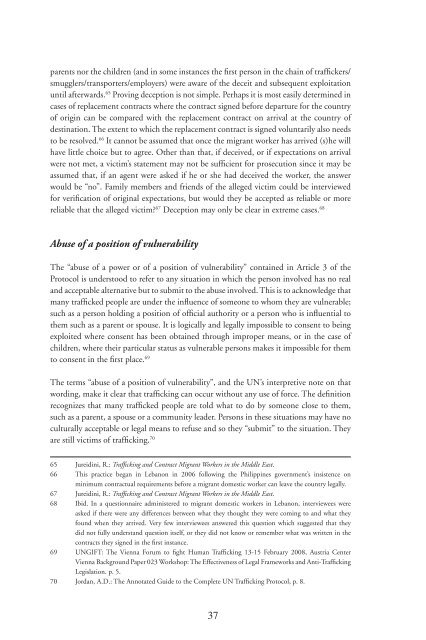Trafficking in human beings: human rights and ... - unesdoc - Unesco
Trafficking in human beings: human rights and ... - unesdoc - Unesco
Trafficking in human beings: human rights and ... - unesdoc - Unesco
Create successful ePaper yourself
Turn your PDF publications into a flip-book with our unique Google optimized e-Paper software.
parents nor the children (<strong>and</strong> <strong>in</strong> some <strong>in</strong>stances the fi rst person <strong>in</strong> the cha<strong>in</strong> of traffi ckers/<br />
smugglers/transporters/employers) were aware of the deceit <strong>and</strong> subsequent exploitation<br />
until afterwards. 65 Prov<strong>in</strong>g deception is not simple. Perhaps it is most easily determ<strong>in</strong>ed <strong>in</strong><br />
cases of replacement contracts where the contract signed before departure for the country<br />
of orig<strong>in</strong> can be compared with the replacement contract on arrival at the country of<br />
dest<strong>in</strong>ation. The extent to which the replacement contract is signed voluntarily also needs<br />
to be resolved. 66 It cannot be assumed that once the migrant worker has arrived (s)he will<br />
have little choice but to agree. Other than that, if deceived, or if expectations on arrival<br />
were not met, a victim’s statement may not be suffi cient for prosecution s<strong>in</strong>ce it may be<br />
assumed that, if an agent were asked if he or she had deceived the worker, the answer<br />
would be “no”. Family members <strong>and</strong> friends of the alleged victim could be <strong>in</strong>terviewed<br />
for verifi cation of orig<strong>in</strong>al expectations, but would they be accepted as reliable or more<br />
reliable that the alleged victim? 67 Deception may only be clear <strong>in</strong> extreme cases. 68<br />
Abuse of a position of vulnerability<br />
The “abuse of a power or of a position of vulnerability” conta<strong>in</strong>ed <strong>in</strong> Article 3 of the<br />
Protocol is understood to refer to any situation <strong>in</strong> which the person <strong>in</strong>volved has no real<br />
<strong>and</strong> acceptable alternative but to submit to the abuse <strong>in</strong>volved. This is to acknowledge that<br />
many traffi cked people are under the <strong>in</strong>fl uence of someone to whom they are vulnerable;<br />
such as a person hold<strong>in</strong>g a position of offi cial authority or a person who is <strong>in</strong>fl uential to<br />
them such as a parent or spouse. It is logically <strong>and</strong> legally impossible to consent to be<strong>in</strong>g<br />
exploited where consent has been obta<strong>in</strong>ed through improper means, or <strong>in</strong> the case of<br />
children, where their particular status as vulnerable persons makes it impossible for them<br />
to consent <strong>in</strong> the fi rst place. 69<br />
The terms “abuse of a position of vulnerability”, <strong>and</strong> the UN’s <strong>in</strong>terpretive note on that<br />
word<strong>in</strong>g, make it clear that traffi ck<strong>in</strong>g can occur without any use of force. The defi nition<br />
recognizes that many traffi cked people are told what to do by someone close to them,<br />
such as a parent, a spouse or a community leader. Persons <strong>in</strong> these situations may have no<br />
culturally acceptable or legal means to refuse <strong>and</strong> so they “submit” to the situation. They<br />
are still victims of traffi ck<strong>in</strong>g. 70<br />
65 Jureid<strong>in</strong>i, R.: Traffi ck<strong>in</strong>g <strong>and</strong> Contract Migrant Workers <strong>in</strong> the Middle East.<br />
66 This practice began <strong>in</strong> Lebanon <strong>in</strong> 2006 follow<strong>in</strong>g the Philipp<strong>in</strong>es government’s <strong>in</strong>sistence on<br />
m<strong>in</strong>imum contractual requirements before a migrant domestic worker can leave the country legally.<br />
67 Jureid<strong>in</strong>i, R.: Traffi ck<strong>in</strong>g <strong>and</strong> Contract Migrant Workers <strong>in</strong> the Middle East.<br />
68 Ibid. In a questionnaire adm<strong>in</strong>istered to migrant domestic workers <strong>in</strong> Lebanon, <strong>in</strong>terviewees were<br />
asked if there were any differences between what they thought they were com<strong>in</strong>g to <strong>and</strong> what they<br />
found when they arrived. Very few <strong>in</strong>terviewees answered this question which suggested that they<br />
did not fully underst<strong>and</strong> question itself, or they did not know or remember what was written <strong>in</strong> the<br />
contracts they signed <strong>in</strong> the fi rst <strong>in</strong>stance.<br />
69 UNGIFT: The Vienna Forum to fi ght Human Traffi ck<strong>in</strong>g 13-15 February 2008, Austria Center<br />
Vienna Background Paper 023 Workshop: The Effectiveness of Legal Frameworks <strong>and</strong> Anti-Traffi ck<strong>in</strong>g<br />
Legislation. p. 5.<br />
70 Jordan, A.D.: The Annotated Guide to the Complete UN Traffi ck<strong>in</strong>g Protocol, p. 8.<br />
37

















